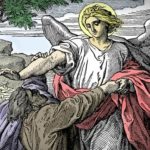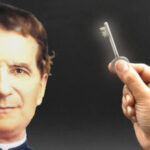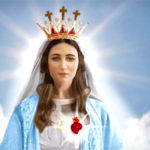In this article we review an incident in the life of St. John Bosco, the saint known among other things for his revelatory and prophetic dreams. In one dream St. John Bosco is severely admonished for having put his hope in men and not in God. It is an important lesson for today’s Christians to meditate on who we put our trust in, to the point of giving access to nothing less than the health of our body, when from Heaven we are warned not to trust in misused human science. Do we consider it prudent to disregard God’s warnings and put our trust in men?
When “Little John” was about 15 years old, he had this dream that appears briefly in his Memoirs of the Oratory (written by St. John Bosco) with a single line: “At that time I had another dream, in which I was severely reprimanded for having put my hope in men and not in the Heavenly Father”. The following is the explanation of this dream and the story behind it:
ADMONITION FROM HEAVEN
DREAM 2. -YEAR 1830.
(B.M. Vol. I, p. 218.-M. O. Decade 1 -4, pp. 43-44)*.
The present dream is only sketched in the Memoirs of the Oratory in these words:
«About that time I had another dream, in which I was severely admonished, for having put my hope in men and not in the Heavenly Father».
To understand the meaning of these words, we must remember a decisive fact of the dreamer’s childhood.
It was an afternoon in the year 1825; John was returning from Butigliera, a cheerful village near Becchi. He had gone there only for the pious purpose of attending a Mission that was being held there, in order to
to prepare the faithful to profit from the Jubilee of the Holy Year, granted by Leo XII and already extended to the Catholic world.
His demeanor was grave and serene; his composure and recollection powerfully attracted the attention of a priest who followed him: Don Giuseppe Calosso, chaplain at that time of the village of Murialdo. The priest, beckoning the boy to approach him, asked him who he was, where he came from and why, being of such a young age, he was attending the sermons of the Mission, adding:
-Surely your mother would have given you a better and more appropriate talk for your age and condition.
Little John affirmed that, in fact, his mother’s talks were very profitable, but that he liked to listen to the missionaries; whom he understood perfectly, and to to prove it, he repeated to the priest, almost literally, the sermons he had heard, point by point.
The virtuous chaplain, marveling at the little boy’s gifts of ingenuity, asked him excitedly:
-Would you like to study?
-Very much! -replied Little John. But I can’t.
-Who’s stopping you?
-My brother Antonio, because he says that studying is a waste of time; that it’s better for me to devote myself to farm work.
-And what would you like to study for?
-To become a priest.
-And why do you want to become a priest?
-To be able to instruct many of my companions who are not bad, but who will become so if no one takes care of them.
Mr. Calosso, moved by such a way of reasoning, took the boy under his protection and taught him during the winters of 1827 and 1828.
But one autumn morning in 1830, while John was in his native village visiting his mother, he received notice to return quickly to Murialdo, because his good teacher Mr. Calosso, suddenly attacked by a fatal illness, called him urgently. John flew to the side of his benefactor, whom he unfortunately found in bed, having lost the use of speech. The dying man was able to recognize his beloved disciple to whom he made a sign to approach, and making a supreme effort, he handed him a key that he kept under his pillow, pointing at the same time to the table of his desk. The disciple took the key, knelt down next to the bed of his benefactor and there he remained afflicted and supplicant until the master, the friend of his soul, had expired, without having been able to articulate a word.
When Mr. Calosso died, his nephews arrived; John handed them the key he had received from his master, saying:
-Your uncle gave me this key, telling me not to give it to anyone. Several people assure me that what is contained in it is mine, but Mr. Calosso did not tell me anything expressly. I prefer my poverty to being the cause of trouble. They took the key and everything that was locked with it.
The death of the benefactor was a real disaster for John. He loved Mr. Calosso tenderly. His memory was engraved forever in his soul, leaving these feelings consigned in his Memoirs with these words:
“I have always prayed to God for this benefactor of mine, and, as long as I live, I will not cease to pray for him.”
Knowing this episode and the state of mind of the young student, it is easy to understand the meaning and scope of this dream.
*References
M. O.: Memoirs of the Oratory, by St. John Bosco.
B. M.: Biographical Memoirs of St. John Bosco, eighteen volumes, by Frs. Lemoyne, Amadei, Ceria, all Salesians. (Societá Editrice Internazionale, Torino).
Thus says the Lord: Cursed is the man who trusts in human beings, who makes flesh his strength, whose heart turns away from the Lord.
Blessed are those who trust in the Lord; the Lord will be their trust. (Jer. 17,5.7)




